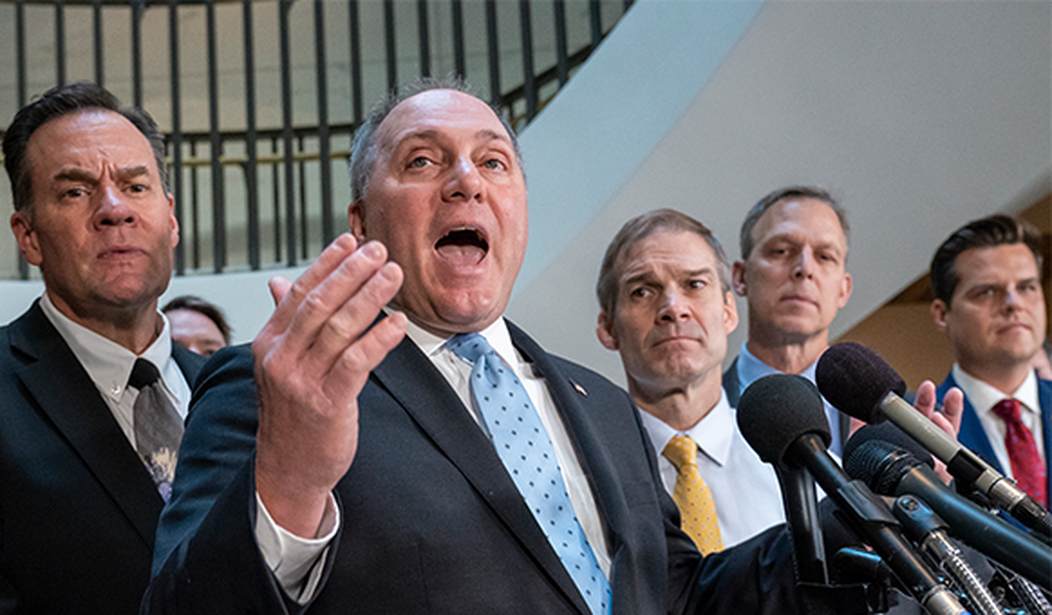A little more than three years ago a gunman wreaked havoc on members of Congress when he opened fire on a practice being held in Alexandria, Virginia for the Congressional Baseball Game's Republican team. House Minority Whip Steve Scalise (R-LA) was wounded as a result of the encounter. It was law enforcement personnel – his security detail – that stopped the rampage, which ended when the gunman was killed. Despite that, Scalise has remained committed to protecting the Second Amendment and said he saw the best in law enforcement that day.
"I saw first hand what police offiers do every day without any national recognition. They put their lives at risk to keep us safe and don’t get enough credit," Scalise told Townhall.
With the unrest over George Floyd's death, the House Minority Whip believes the are policy changes that can be implemented that will be a benefit to Americans across the board.
"When we watched the George Floyd video I think everybody was just disgusted by what they saw. We’re working on reforms that address some of the problems that we’ve seen that have come out of this but at the same time we’re not undermining the important work that law enforcement does to keep communities safe," he said.
"If they're a bad apple, root them out. Nobody disagrees with that. We have to be careful to remember that they put their life on the line. Don’t paint them all with a bad brush," he explained.
He made it clear he sees the men and women in uniform as "brave and heroic" and he's appreciative of the work they do each and every day.
"They don’t do it for recognition. They do it because it’s a calling," Scalise said.
Police reforms seem to be an area where both the left and the right can come together to find a bipartisan solution, assuming people are focused on a common goal, he reiterated.
"President Trump can take action administratively but Congress ultimately needs to come together to address things the president can’t do on his own and we need to rise to his challenge," he said. "If you’re serious about making law and real lasting reforms, you've got to work with people on all sides and work with the White House to get the president to sign the bill."
Recommended
There are multiple ways change can be brought about to policing throughout the United States and that's through "community policing," where a police officer has deep ties to his or her community.
"Embedding officers in the community creates better relationships," Scalise explained.
On top of that, Scalise praised the idea of having a national database of cops who have been deemed "bad apples," which would prevent them from finding jobs elsewhere when fired from one department.
"We need a national database of police officers who were fired for being bad cops so they can’t go from one agency to another without the next agency knowing they were fired for being a bad cop," he said, a little more than an hour before President Trump announced his executive order making this wish a reality.
Utilizing body cameras and dash cams are also favored as a means to increase transparency. But the biggest difference, Scalise said, is having police departments share their best practices and have strong leadership. In his eyes, that can make and break a police department.
"Minneapolis had a reputation from surrounding departments as badly run," he said. "In the 1990s New Orleans had real issues and was the murder capital of the world. The mayor brought in a new police chief, enacted community policing, better recruitment and training."
According to the House Minority Whip, Minneapolis needs to make some of the same changes New Orleans did. And there are likely other cities across the country that could benefit from stronger leadership and training.
Even though the task of police reform seems like a daunting task, Scalise remains hopeful that Congress can come together like they did to pass the First Step Act.
"If a cop steps out and does the wrong thing, then that's painted as the norm and that's not the case," he said. "There's a lot of support for rooting out bad apples. Hopefully, everyone comes together to solve this."
























Join the conversation as a VIP Member